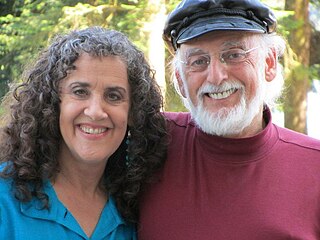
Parenting or child rearing promotes and supports the physical, emotional, social, spiritual and intellectual development of a child from infancy to adulthood. Parenting refers to the intricacies of raising a child and not exclusively for a biological relationship.
Confirmation bias is the tendency to search for, interpret, favor, and recall information in a way that confirms or supports one's prior beliefs or values. People display this bias when they select information that supports their views, ignoring contrary information, or when they interpret ambiguous evidence as supporting their existing attitudes. The effect is strongest for desired outcomes, for emotionally charged issues, and for deeply entrenched beliefs. Confirmation bias cannot be eliminated, but it can be managed, for example, by education and training in critical thinking skills.
The concept of interpersonal relationship involves social associations, connections, or affiliations between two or more people. Interpersonal relationships vary in their degree of intimacy or self-disclosure, but also in their duration, in their reciprocity and in their power distribution, to name only a few dimensions. The context can vary from family or kinship relations, friendship, marriage, relations with associates, work, clubs, neighborhoods, and places of worship. Relationships may be regulated by law, custom, or mutual agreement, and form the basis of social groups and of society as a whole. Interpersonal relationships are created by people's interactions with one another in social situations.

Sadness is an emotional pain associated with, or characterized by, feelings of disadvantage, loss, despair, grief, helplessness, disappointment and sorrow. An individual experiencing sadness may become quiet or lethargic, and withdraw themselves from others. An example of severe sadness is depression, a mood which can be brought on by major depressive disorder or persistent depressive disorder. Crying can be an indication of sadness.

Imaginary friends are a psychological and social phenomenon where a friendship or other interpersonal relationship takes place in the imagination rather than physical reality.

Attachment theory is a psychological, evolutionary and ethological theory concerning relationships between humans. The most important tenet is that young children need to develop a relationship with at least one primary caregiver for normal social and emotional development. The theory was formulated by psychiatrist and psychoanalyst John Bowlby.

David Michael Buss is an American evolutionary psychologist at the University of Texas at Austin, researching human sex differences in mate selection. He is considered one of the founders of evolutionary psychology.

John Mordechai Gottman is an American psychologist, professor emeritus of psychology at the University of Washington. His work focuses on divorce prediction and marital stability through relationship analyses. The lessons derived from this work represent a partial basis for the relationship counseling movement that aims to improve relationship functioning and the avoidance of those behaviors shown by Gottman and other researchers to harm human relationships. His work has also had a major impact on the development of important concepts on social sequence analysis. He and his wife, psychologist Julie Schwartz Gottman, co-founded and lead a relationship company and therapist training entity called The Gottman Institute. They have also co-founded Affective Software Inc, a program designed to make marriage and relationship counseling methods and resources available to a larger audience.
In psychology, the theory of attachment can be applied to adult relationships including friendships, emotional affairs, adult romantic or carnal relationships or platonic relationships, and, in some cases, relationships with inanimate objects. Attachment theory, initially studied in the 1960s and 1970s primarily in the context of children and parents, was extended to adult relationships in the late 1980s. The working models of children found in Bowlby's attachment theory form a pattern of interaction likely to continue influencing adult relationships.
Meta-emotion is "an organized and structured set of emotions and cognitions about the emotions, both one's own emotions and the emotions of others". This broad definition of meta-emotion sparked psychologists' interest in the topic, particularly regarding parental meta-emotion philosophy.
According to some theories, emotions are universal phenomena, albeit affected by culture. Emotions are "internal phenomena that can, but do not always, make themselves observable through expression and behavior". While some emotions are universal and are experienced in similar ways as a reaction to similar events across all cultures, other emotions show considerable cultural differences in their antecedent events, the way they are experienced, the reactions they provoke and the way they are perceived by the surrounding society. According to other theories, termed social constructionist, emotions are more deeply culturally influenced. The components of emotions are universal, but the patterns are social constructions. Some also theorize that culture is affected by emotions of the people.
Self-enhancement is a type of motivation that works to make people feel good about themselves and to maintain self-esteem. This motive becomes especially prominent in situations of threat, failure or blows to one's self-esteem. Self-enhancement involves a preference for positive over negative self-views. It is one of the three self-evaluation motives along with self-assessment and self-verification . Self-evaluation motives drive the process of self-regulation, that is, how people control and direct their own actions.

Friendship is a relationship of mutual affection between people. It is a stronger form of interpersonal bond than an "acquaintance" or an "association", such as a classmate, neighbor, coworker, or colleague.
Display rules are a social group or culture's informal norms that distinguish how one should express themselves. They can be described as culturally prescribed rules that people learn early on in their lives by interactions and socializations with other people. They learn these cultural standards at a young age which determine when one would express certain emotions, where and to what extent.
Emotional self-regulation or emotion regulation is the ability to respond to the ongoing demands of experience with the range of emotions in a manner that is socially tolerable and sufficiently flexible to permit spontaneous reactions as well as the ability to delay spontaneous reactions as needed. It can also be defined as extrinsic and intrinsic processes responsible for monitoring, evaluating, and modifying emotional reactions. Emotional self-regulation belongs to the broader set of emotion regulation processes, which includes both the regulation of one's own feelings and the regulation of other people's feelings.
Manipulation in psychology is a behavior designed to exploit, control, or otherwise influence others to one’s advantage. Definitions for the term vary in which behavior is specifically included, influenced by both culture and whether referring to the general population or used in clinical contexts. Manipulation is generally considered a dishonest form of social influence as it is used at the expense of others.

Catch, or playing catch, is one of the most basic children's games, often played between children or between a parent and child, wherein the participants throw a ball, beanbag, flying disc or similar object back and forth to each other. At early stages in a child's life, having a catch is a good way to evaluate and improve the child's physical coordination. Notably, "[i]f a child cannot catch a ball that he or she is bouncing, it is unlikely the child will be able to play catch". Most children begin to be able to play catch around the age of four. Many four-year-olds instinctively close their eyes when a ball is heading towards them, and it can take some time to overcome this. Playing catch can help develop dexterity, coordination and confidence.
The relationship between gender and emotional expression describes the differences in behavior and actions to express emotions between men and women. In general, women tend to be more emotionally expressive than men. These differences may be primarily due to cultural expectations of femininity and masculinity.
Toni Falbo is a social psychologist known for her research on power dynamics in relationships, sibling status, and development of only children. She is a professor of Educational Psychology and Faculty Research Affiliate of the Population Research Center at the University of Texas at Austin.
Social emotional development represents a specific domain of child development. It is a gradual, integrative process through which children acquire the capacity to understand, experience, express, and manage emotions and to develop meaningful relationships with others. As such, social emotional development encompasses a large range of skills and constructs, including, but not limited to: self-awareness, joint attention, play, theory of mind, self-esteem, emotion regulation, friendships, and identity development.







